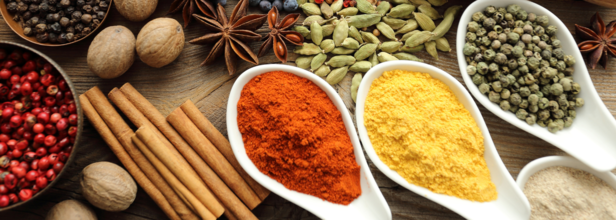
Do Spices Really Have Health Benefits?
Spices in dishes is not a new thing today. It might have been new years back, when to procure spice, trading began. In fact, the British East India company played a significant role in monopolizing the spice trade during the colonial period. But today, spice is one of the most common things one can find in their food. Whether it is chilli, turmeric or any other spices, it not hidden to the world that some of them have their own health benefits. In fact, there are claims that they help boost our immune system too, but how does it really help?
If reports are to be believed, Hillary Clinton ate one chilli pepper a day while campaigning in 2016 to ward of illness. In Asia, turmeric is a go to spice, in fact now, in West, it has found its way into coffee shops, forming the "Golden lattes". This was a viral trend during the pandemic to boost your immune system. If you look at the food trends, to lost weight, to gain better immunity and more, you will find spices all across.
Chilli Peppers
One of the most widely used spices are chilli peppers, there have been studies done on them too. Though, the studies have found both, adverse and beneficial results. Capsaicin is the main active ingredient in chillies and when we eat them, these molecules interact with temperature receptors in our bodies and send signals to our brain. This is why we feel hot after eating chilli peppers.
A 2019 Italian study found that people who ate food with chilli peppers four times a week had a lower risk of death compared to those who never ate chillies. Another study done earlier in 2015, researchers in China examined that eating chillies was associated with lower risk of death. This was done after conducting a study on 500,000 Chinese adults. The study found that those who consumed spicy foods every day had a 14% lower risk of death than those who ate spicy foods less than once a week.
Another study conducted by Zumin She, associate professor at Qatar University's human nutrition department found that chilli too helps lower the risk of obesity and high blood pressure. However when she studied the effects of chilli pepper consumption on cognitive function, it revealed something else.
She noted that people who ate more chillies had poorer cognitive function. The study showed that chilli intake above 50g per day as associated with double the risk of self-reported poor memory.
Turmeric
Turmeric has long been praised for its health benefits, with its bright yellow compound, curcumin, often credited as the magic ingredient. Used in traditional medicine for centuries, turmeric is believed to help with inflammation, stress, and even serious conditions like cancer. But does science support these claims?
Laboratory studies suggest curcumin has strong anti-inflammatory and antioxidant properties. Some research even indicates it may have anti-cancer effects—at least in test tubes. Turmeric is also widely used in Ayurvedic medicine to promote balance in the body, an idea that has been gaining traction in modern wellness circles.
There’s also growing interest in spice-based supplements. For example, a 2023 study found that taking a daily ginger supplement can help control inflammation in people with autoimmune diseases like lupus and rheumatoid arthritis. Some researchers believe turmeric, when consumed in higher doses or in combination with certain ingredients (like black pepper, which enhances absorption), may also offer health benefits.
The good news is that turmeric is generally safe to consume in regular dietary amounts. However, experts caution against relying on it as a cure-all. High doses of turmeric supplements may cause digestive discomfort in some people, and more research is needed before it can be recommended as a reliable treatment for serious conditions.
© 2024 Bennett, Coleman & Company Limited

